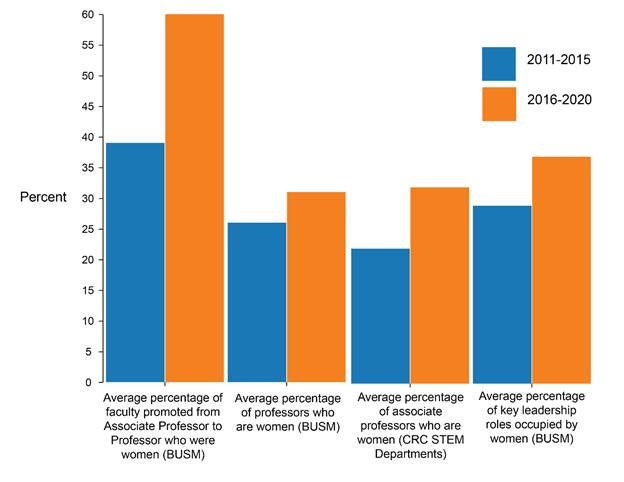BU Recognized by NIH for Enhancing Faculty Gender Diversity
Boston University (BU) is one of 10 institutions to receive a $50,000 Prize for Enhancing Faculty Gender Diversity from the Office of Research on Women’s Health at the National Institutes of Health. The award recognizes institutions that have made systemic changes to improve gender diversity and equity among faculty members within their biomedical and behavioral science departments, centers or divisions.
Women continue to be under-represented at nearly every institution of higher education in the United States in the fields of biomedical, behavioral sciences and engineering, particularly among mid- to senior-level faculty ranks. “Retaining women in science, technology, engineering, math, and medicine (STEMM) and fostering their career growth requires a comprehensive, data-informed approach grounded in opportunities for professional development and mentorship,” says Megan H Bair-Merritt, MD, MSCE, professor of pediatrics and board-certified pediatrician at Boston Medical Center (BMC), who led the BU application for the prize.
For the past five years (2016-2020), three Offices across BUSM and the Charles River Campus (CRC) have implemented a three-pronged approach that includes: (1) faculty development programs that provide women with opportunities to build new skills, form peer networks and receive career mentoring; (2) research-focused longitudinal workshops to enhance extramural funding success; and (3) career coaching. “All components seek to support a diverse group of women STEMM faculty members throughout their career trajectories,” explains Bair-Merritt, who also is the Chair of Women’s Leadership in the BU Medical Group’s Office of Equity, Vitality and Inclusion, multi-PI of the BU-Boston Medical Center (BMC) Clinical and Translational Science Institute, and Director of the Center for the Urban Child and Healthy Family at BMC. According to her, this approach has been developed to allow for generalizability and adaptability in diverse settings.
This approach substantively improved gender equity across metrics including increased rates of promotion for women, more women at higher faculty ranks and diversified leadership across both BUSM and the CRC.

Joyce Y. Wong, PhD, professor of biomedical engineering and materials science & engineering and Inaugural Director of the ARROWS (Advance, Recruit, Retain & Organize Women in STEM) Program in the Office of the Provost at the CRC, is excited to be part of this team. “The significant advances we have made across BUSM and CRC are a result of hard work over the years, demonstrating the strong commitment the institution has towards gender diversity and equity. In our quest to achieve diversity, equity, and inclusion, we must acknowledge and address the devastating and ongoing impacts of the pandemic. While caregiving is not inherently gendered, we recognize – with support from numerous data-driven studies [National Academies Report] – female faculty collectively bear a larger fraction of the work of caring for children and elders in their families. Bold actions fostering diversity, equity, and inclusion will distinguish the leading Institutions as we move forward,” says Wong.
Bair-Merritt attended the University of North Carolina School of Medicine and completed her residency and fellowship at the Children’s Hospital of Philadelphia. As a pediatrician and child health services researcher, she has conducted social epidemiology and intervention research in the area of family violence for over 15 years. She has published more than 80 scientific and/or invited articles, 14 letters/editorials, and 10 book chapters which predominantly focus on family violence and child health. She has received three R01-level awards as PI (and three additional awards as Co-I) from the National Institute of Justice and the Maternal and Child Health Bureau, an AHRQ T32 training grant, and multiple large foundation grants.
The Prize for Enhancing Faculty Gender Diversity seeks to recognize institutions whose biomedical and behavioral science departments, centers, or divisions have achieved sustained improvement in gender diversity. Understanding that there is no “one-size-fits-all” solution to enhancing diversity in academia and that ideas based on evidence are necessary to achieve systemic change, this prize will acknowledge and recognize transformative approaches, systems, projects, programs, and processes that have successfully enhanced and sustained gender diversity within an institution.
View all posts